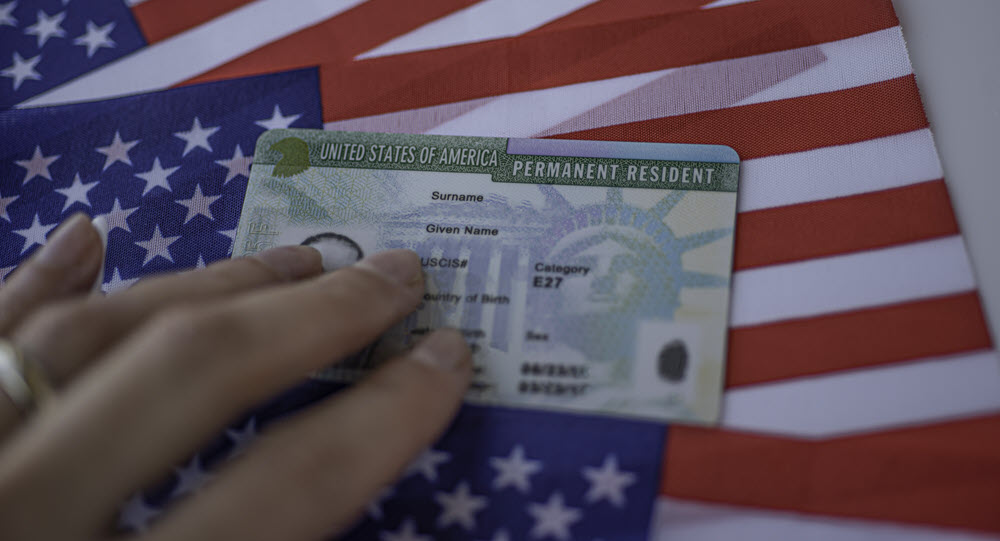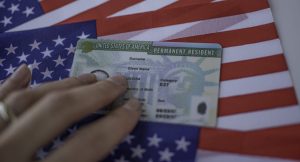**Note: Castro Law Offices, P.C. is no longer offering Immigration Law Services.**
Immigration Visas and Green Cards
Visas give permission to be in the United States. There are two types of visas: immigrant and non-immigrant.
Immigrant visas, also known as “green cards,” are given to people who are authorized to work and live in the U.S. permanently. Green card holders are called lawful permanent residents (LPRs).
The attorneys at Castro Law Offices, P.C. represent clients throughout the immigrant visa process. We have experience with the following categories of immigrant visas.
Adjustment of Status via Form I-485
A person who is already living in the United States could be eligible to change their immigration status to that of an LPR (“green card holder”) through a process called adjustment of status (AOS), using Form I-485. If a person qualifies for AOS, the interview process takes place in the United States, without the need for “consular processing” in your home country.
AOS might be an option if, for example: you entered the United States on a visa and then married a United States Citizen; you entered the U.S. without papers and then married a member of the United States military; or a relative submitted a family petition for you on or before April 30, 2001. This list is not exhaustive. There are many different ways to qualify for adjustment of status.
Conditional Residence and Form I-751
If you have been married for less than two years at the time you are granted Lawful Permanent Resident (LPR) status, you will be granted Conditional Residence for two years. Prior to the expiration of the two-year period, you must file application Form I-751 to “remove the conditions” from your green card. You can request to remove the conditions because you are still married, because you have filed for divorce, or because your spouse has been abusive.
I-601 and I-601A Waivers
If you entered the United States without a visa, you may qualify for Lawful Permanent Residence (LPR status) based on a family petition. However, unless a family member submitted a petition for you on or before April 30, 2001, it is likely that you will need to request a waiver before becoming a LPR.
I-601A is one kind of waiver process. This process involves showing United States and Citizenship Immigration Services (USCIS) how your United States Citizen or LPR parent or spouse (known as the “qualifying relative”) would suffer if you are forced to remain outside of the United States for an extended period of time.
Prior to the creation of the I-601A process, Form I-601 was the only option for many immigrants. The I-601 process lead to spouses being separated for months at a time while the immigrant spouse waited on a case decision in his or her home country. Form I-601A is an improvement to the process. If the application packet is prepared well, the immigrant should only have to be separated from their spouse in the United States for a matter of weeks (rather than months) before re-entering the United States as a LPR.
Citizenship (also know as Naturalization)
Lawful Permanent Residents (LPRs) who want to become U.S. citizens must apply to naturalize using Form N-400. Naturalize is just a fancy immigration term which means to apply for citizenship. In order to become a citizen, it is typically necessary to study for an exam and show the interviewing officer that you can speak English. However, you may qualify to take the exam in your native language depending on your age and how long you have had your LPR card (“green card”). If you have a medical condition which has impaired your ability to study, you might not have to take the exam. Your doctor will have to complete Form N-648. It is recommended that an immigration attorney collaborate with your doctor to ensure Form N-648 is completed properly.
We recommend that every LPR consult with an attorney regarding citizenship. As a naturalized citizen of the United States, you will be able to vote. Also, LPRs are still at risk of being deported from the United States if they commit certain criminal offenses. And LPR status can be lost if an LPR remains outside of the United States for too long. These restrictions do not apply once you become a citizen.
Consular Processing via the NVC
People outside of the United States who want to apply for an immigrant visa or change their status can do so through consular processing. The National Visa Center (NVC) collects your documents (including application form DS-260) and fees and submits them to the United States Embassy in your home country. The embassy then schedules your interview. If you are successful at your embassy interview, you will be granted LPR status.
If you are awaiting your consular interview, information about your case is accessible at the following website:
ceac.state.gov
Family Sponsorship via Form I-130
Family Sponsorship via Form I-130
One of the most common ways for someone to obtain an immigrant visa or LPR status is through family sponsorship. Citizens and LPRs can petition for certain family members to immigrate to the U.S.:
• Spouses
• Unmarried children under 21 years old
• Orphans adopted abroad
• Parents
Grandparents, grandchildren, uncles, aunts, in-laws, and cousins generally cannot be sponsored.
The first step is submitting a family visa petition (I-130) to establish the familial relationship between the immigrant and the U.S. citizen or LPR.
The second step involves submitting Form I-864, the Affidavit of Support, showing that the United States Citizen or LPR sponsor is financially capable of supporting the immigrant. If the main U.S. Citizen (or LPR) sponsor has a low income, a third party (usually a family member or friend) who is a U.S. Citizen or LPR can submit his or her financial documents and become a “co-sponsor.”
Political Asylum via Form I-589
If you fled your home country due to persecution, you may qualify for asylum. You may even qualify for asylum on the basis of something that happened a very long time ago.
Form I-589 is used to apply for asylum. The asylum process is complicated. You must show that you have been persecuted because of your race, ethnicity, religion, nationality, political opinion, or “membership in a particular social group.”
If you recently arrived to the United States, it is recommended that you consult with an immigration attorney as soon as possible to discuss your asylum claim. If you file Form I-589 more than one year after your date of entry to the United States, the case will be more difficult to win.
I-360 Petition under the Violence Against Women Act (VAWA)
If you are married to a United States Citizen or Lawful Permanent Resident who has treated you poorly, you may qualify to file a “self-petition” under the Violence Against Women Act. You file this I-360 “self-petition” on your own, without your spouse’s assistance. You may qualify for Lawful Permanent Residence under this law even if there was no physical abuse, and even if the marriage has ended.
Temporary Protected Status (TPS)
The United States government sometimes offers Temporary Protected Status (TPS) to individuals whose countries have been affected by a natural disaster. USCIS gives these individuals work authorization which can be renewed up until the time the United States government decides it is safe for those individuals to return to their home countries. Individuals from El Salvador, Haiti, Honduras, Nepal, Nicaragua, Somalia, Sudan, South Sudan, Syria, and Yemen may qualify for TPS. Our office can assist you with your TPS renewal or your first-time application.
Advance Parole (Form I-131)
Beneficiaries of TPS, beneficiaries of DACA, and those with pending Adjustment of Status (AOS) applications may qualify to file Form I-131 to request permission to take a trip outside of the United States. You should consult with an attorney before filing Form I-131.
Fiancé Visa (Form I-129F)
If you are a United States Citizen, you may qualify to request a Fiancé Visa for your partner so that he/she can enter the United States and marry you here (within 90 days) before applying for Lawful Permanent Residence (LPR status).
Visitor (“tourist”) Visa Extension (Form I-539)
After entering the United States through the Visa Waiver Program (“ESTA”), or on a visitor visa (B2 visa), many immigrants have found themselves unable to return to their home countries because of the pandemic. Form I-539 is used to ask the U.S. government for permission to extend your stay. There are also reasons not related to the pandemic which could justify an extension of your stay.
Deferred Action for Childhood Arrivals (DACA)
After Congress failed to pass the Dream Act, President Obama ordered protection for those who arrived to the United States as children. President Obama’s program is called “DACA.” DACA is a benefit available to some individuals (sometimes referred to as “Dreamers”) who entered the United States when they were children. There have been numerous attempts to cancel DACA ever since the program’s creation in 2012. All of these attempts have failed. In June of 2020, the United States Supreme Court decided that former President Trump’s attempt to cancel the DACA program was unlawful. President Biden is in full support of DACA. Beginning on December 7, 2020, USCIS will:
– Start accepting new (first-time) DACA applications
– Continue to accept DACA renewal applications
– Start accepting applications from DACA grantees for advance parole
– Extend to two years any DACA protections and work permits it had granted for one year.
Public Charge
There has been a lot in the news recently about “public charge” issues. Based on scary news stories, many families have taken steps to cancel their children’s health insurance and other desperately needed benefits for fear that receiving such “public benefits” would destroy future chances of gaining lawful status in the United States.
This “public charge” rule should improve now that President Biden has taken office.
Many families mistakenly believe that the “public charge” rules apply to them when in reality this rule does not apply to everyone. This must be analyzed on a case-by-case basis. You should consult with an immigration attorney prior to canceling any insurance plan or other public benefit on which your family relies.
Special Immigrant Juvenile Status
Special Immigrant Juvenile Status (SIJS) is a form of immigration relief that provides qualifying minors with a pathway to legal permanent residence and United States citizenship. There are several requirements that must be satisfied before a child is eligible for this form of immigration relief. First, the individual must be less that either 18 years old or 21 years old. Second, reunification of the child with one or both of his/her parents is not viable due to abuse, abandonment or neglect. Lastly, it is not in the child’s best interest to return to his/her country of origin. These cases are essentially a two-step process because they begin in the Superior Court of the county in which the child resides. There, the County Superior Court will make “Special Immigrant Juvenile Findings”. Then, the child may apply for Special Immigrant Juvenile Status with U.S. Citizenship and Immigration Services (USCIS). When an approved SIJS application is received from USCIS, and a visa becomes available for the child, then the child becomes eligible to apply for adjustment of status in order to obtain legal permanent residence. After holding this legal permanent residence for between three and five years, the child may naturalize in order to become a U.S. Citizen.
U Visa
Individuals who have been victims of certain qualifying crimes, suffered physical or mental harm as a result of that crime and assists law enforcement in the apprehension and prosecution of the perpetrator of that crime may be eligible for this form of immigration relief. Individuals who are eligible for this form of immigration relief may also be able to obtain derivative relief for their family members, including their spouse, child, parent or sibling.
The qualifying crimes include the following:
• Abusive Sexual Contact
• Being Held Hostage
• Blackmail
• Domestic Violence
• Extortion
• False Imprisonment
• Felonious Assault
• Female Genital Mutilation
• Fraud in Foreign Labor Contracting
• Incest
• Involuntary Servitude
• Kidnapping
• Manslaughter
• Murder
• Obstruction of Justice
• Peonage
• Perjury
• Prostitution
• Rape
• Sexual Assault
• Sexual Exploitation
• Slave Trade
• Stalking
• Torture
• Trafficking
• Unlawful Criminal Restraint
• Witness Tampering
• Attempts to Commit Any of the Above Crimes
• Conspiracy to Commit Any of the Above Crimes
• Solicitation to Commit Any of the Above Crimes
**Castro Law Offices, P.C. is no longer offering Immigration Law Services.** We are a premier California law firm that focuses in family law in English & Spanish. Castro Law Offices, P.C. is based in Novato, California, but is ready and able to provide legal services and advice to clients in and around Marin County including Novato, San Rafael, Greenbrae, San Anselmo, Fairfax, Sausalito, Larkspur, West Marin, Ross, Mill Valley and Corte Madera. Contact Castro Law Offices, P.C. today to schedule a confidential consultation!




